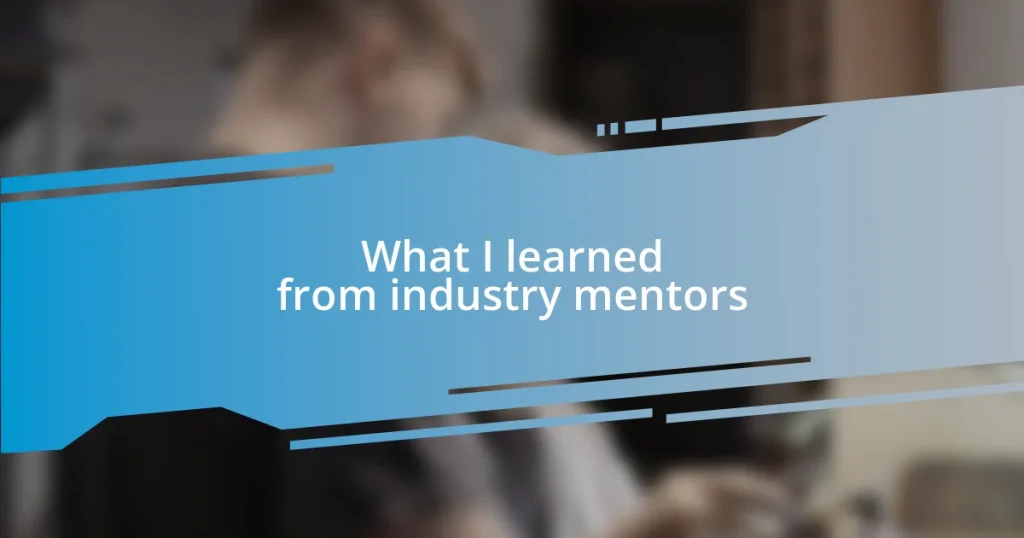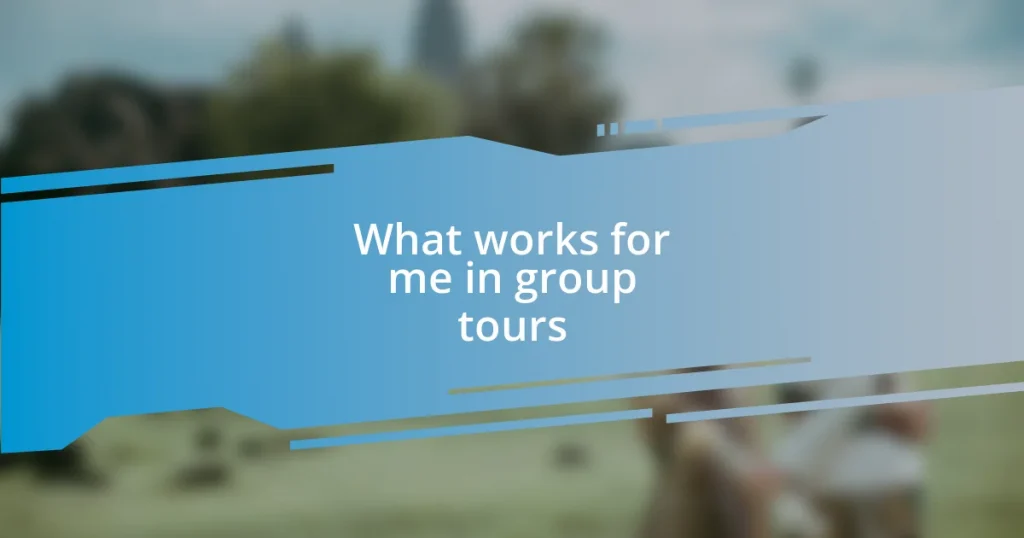Key takeaways:
- Mentors provide invaluable guidance, emotional support, and inspiration, helping individuals identify and overcome personal barriers.
- Effective mentor relationships require proactivity, clear communication, and goal-setting practices, transforming mentorship into a productive partnership.
- Learning from real-life examples shared by mentors enhances understanding, while applying their lessons fosters personal and professional growth.
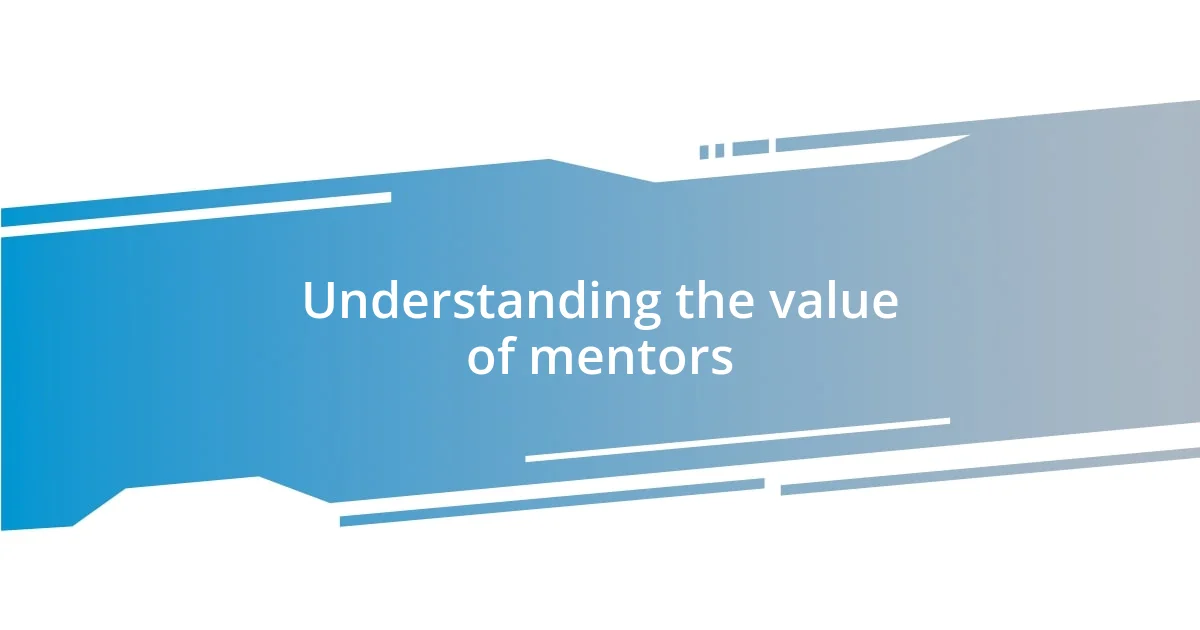
Understanding the value of mentors
Mentors are like navigators in the vast sea of our careers. I remember the time I was at a crossroads, unsure whether to pivot to a new role or to stay in my comfort zone. My mentor challenged me with a simple yet profound question: “What fears are holding you back?” That moment of reflection opened my eyes to the barriers I had placed in front of myself, illustrating just how invaluable a mentor can be in highlighting our blind spots.
Beyond just guidance, mentors often serve as a source of inspiration. I once worked with a mentor who, despite facing numerous setbacks, remained determined and optimistic. Their resilience inspired me to adopt a similar mindset when I faced my own challenges. Isn’t it amazing how the right person can help us unlock potential we didn’t even know we had?
Additionally, the emotional support that mentors provide is often underestimated. During tough times in my career, just knowing I had someone who believed in me made a significant difference. It makes you wonder, don’t we all need that encouraging voice during moments of doubt? Mentors not only share their knowledge but also nurture our confidence, making their role essential in personal and professional growth.
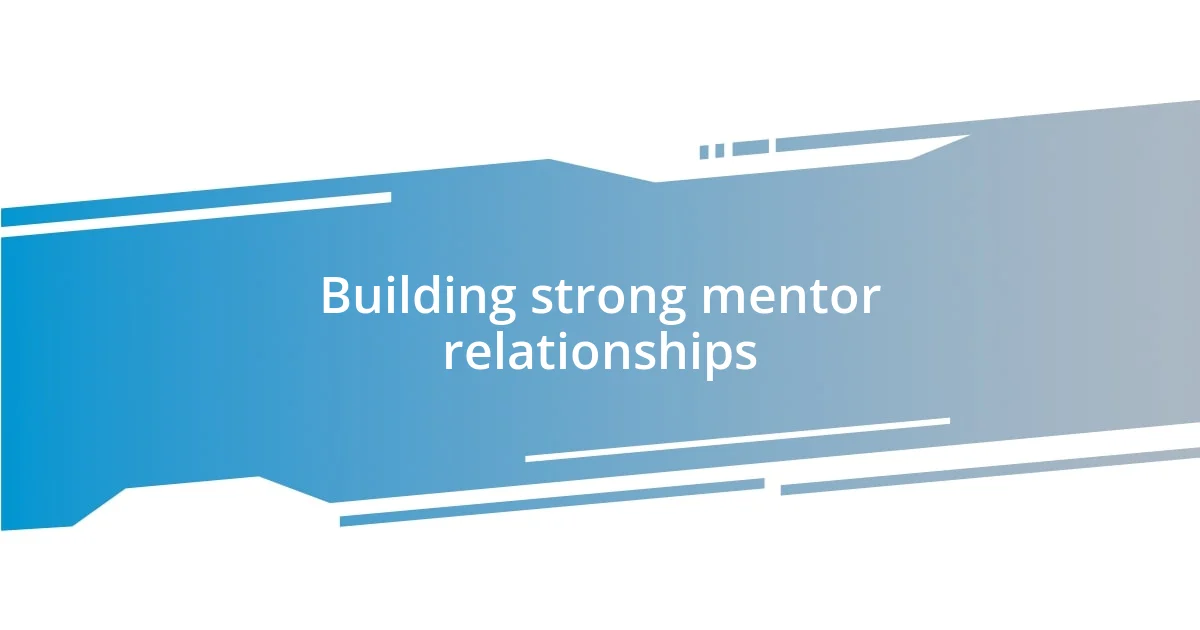
Building strong mentor relationships
Building strong mentor relationships requires intentional effort and clear communication. In my experience, being open and honest about expectations can set a solid foundation. I remember connecting with a mentor for the first time, feeling nervous yet excited. I decided to be upfront about my goals and the skills I hoped to develop, which helped us create a focused roadmap for our meetings. This transparency not only built trust but made our time together significantly more productive.
To strengthen your relationships with mentors, consider these key points:
- Be proactive in scheduling meetings: Consistency is crucial; it shows you value their time.
- Prepare for discussions: Come with specific topics or questions to maximize each session.
- Show appreciation: A simple thank you can go a long way in acknowledging their support.
- Act on feedback: Demonstrating that you take their advice seriously fosters a deeper connection.
- Share your progress: Keeping mentors updated creates a sense of involvement in your journey.
Investing in these practices paid off immensely for me. It transformed my mentorship from a simple exchange into a dynamic partnership, one where we both learned and grew.
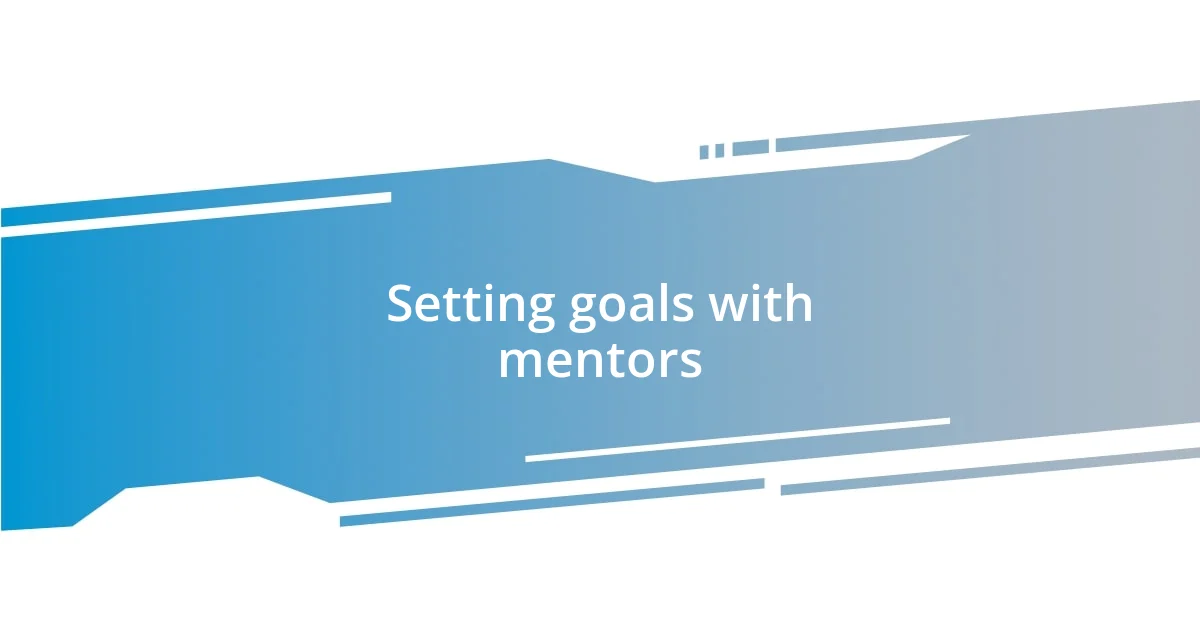
Setting goals with mentors
Setting goals with mentors can significantly sharpen your career direction. I vividly recall a moment when I approached my mentor with a vague wish to advance in my career. Instead of offering vague encouragement, they prompted me to identify specific skills I wanted to develop. That conversation was a game changer; it helped me transform aspirations into actionable goals. Having such clarity not only boosted my motivation but also made my mentorship sessions so much more focused.
As we navigated this journey together, my mentor introduced the SMART criteria for goal-setting: Specific, Measurable, Achievable, Relevant, and Time-bound. It resonated with me deeply when they emphasized that each goal should reflect my individual aspirations and circumstances. I remember crafting my goals such as “I want to lead a project within the next six months,” which felt both concrete and achievable. This wasn’t just theory; it provided a tangible framework that kept me accountable.
A mentor doesn’t just help set goals; they also offer invaluable insights after setting them. I once faced a setback that shook my confidence, but my mentor expertly guided me to reassess my goals and adapt my approach. “Failure is just a stepping stone,” they’d say, reminding me that flexibility is key. This experience taught me that with the right mentorship, goal-setting can transform into a dynamic process instead of a one-time task.
| Goal Setting Aspect | My Experience |
|---|---|
| Specificity | Focused discussions helped me pinpoint areas for growth |
| SMART Criteria | Guided me to set realistic and measurable goals |
| Adapting Goals | Learned to pivot my approach after setbacks |
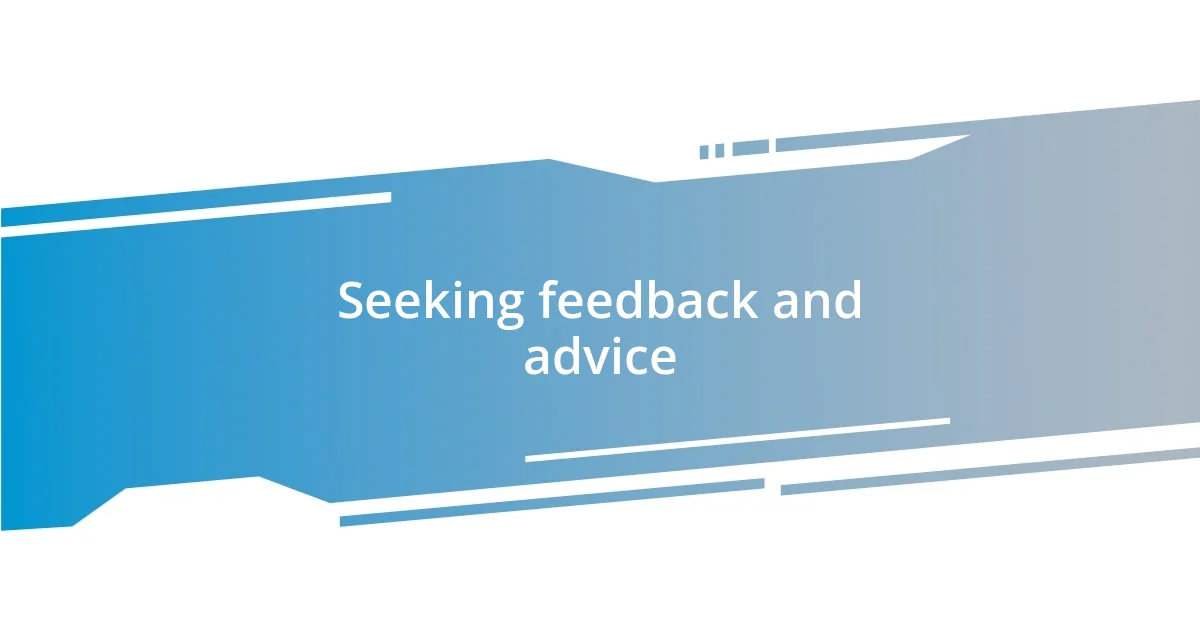
Seeking feedback and advice
Seeking feedback and advice is one of the most enriching aspects of mentorship. I remember asking my mentor for feedback on a project I had invested countless hours in. I was nervous, thinking about how I would react to any criticism. To my surprise, their constructive feedback not only highlighted areas for improvement but also pointed out strengths I hadn’t recognized in myself. It made me realize that feedback isn’t just about fixing mistakes; it’s a vital part of growth.
I think it’s important to create an environment where feedback flows freely. When I began to actively seek my mentor’s insights, I noticed an incredible shift in our dynamic. I would ask questions like, “What do you think I could have done differently in that presentation?” This not only encouraged my mentor to share their perspectives but also showed that I valued their input. There’s something so empowering about framing a question and being genuinely open to the answer—it fosters a more meaningful dialogue and builds mutual respect.
Acting on advice is where the magic truly happens. After receiving guidance, I made it a point to implement what I’d learned in practical situations. One time, after a feedback session, I took the plunge to apply their suggestions in my next project. The results were undeniably better, and it reinforced my mentor’s belief in my abilities. I found myself thinking, how often do we let valuable advice go unheeded? Embracing feedback helps bridge the gap between where we are and where we aim to be.
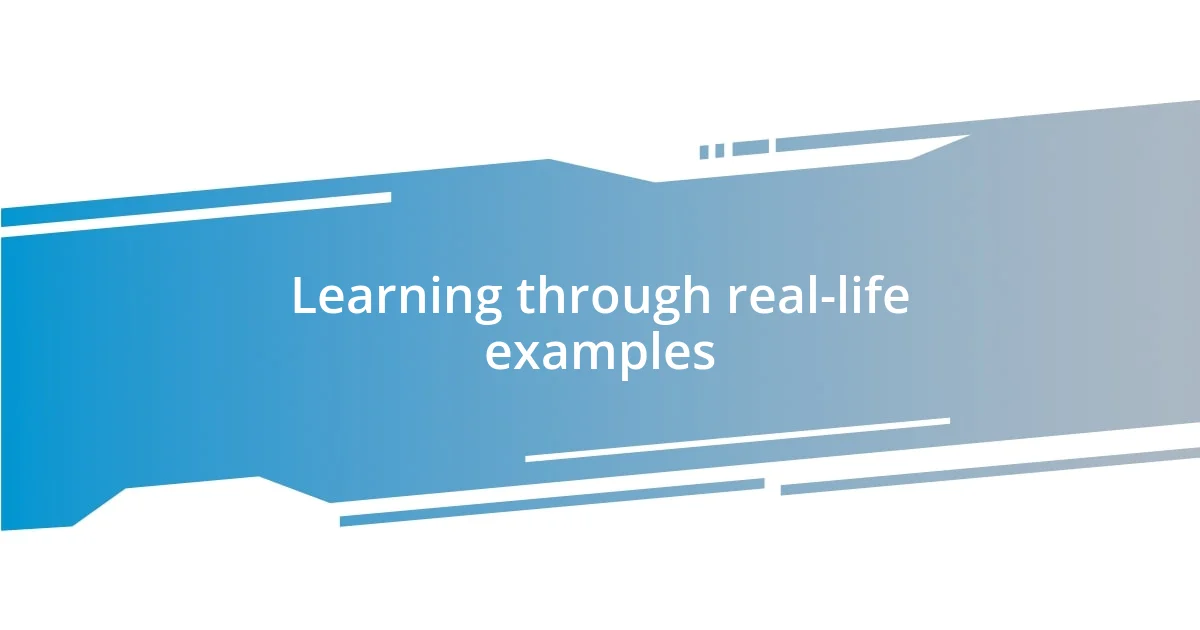
Learning through real-life examples
Learning through real-life examples is perhaps one of the most impactful ways mentorship shapes our understanding and skills. I vividly remember a project my mentor shared from their early career. They navigated a colossal setback when a key client pulled out last minute. Instead of viewing it solely as a failure, they recounted how they pivoted their approach, focusing not on the loss but on developing a stronger product. This story opened my eyes to the power of resilience and adaptability in real situations—qualities much harder to grasp through mere theory.
Another memorable lesson came from a group workshop my mentor led, which I dived into with great enthusiasm. As we examined case studies, my mentor pointed out the nuances behind each decision made in challenging situations. Observing their thought process revealed how seemingly minor choices could lead to significant outcomes. It reminded me that experience is often our best teacher, and I found myself asking, “What would I do in a similar scenario?” Through analyzing others’ experiences, I’ve learned the importance of strategic thinking and the details that can make or break a project.
One of the most profound takeaways for me came during a casual lunch conversation with my mentor. They illustrated how they learned various marketing strategies by experimenting with real campaigns rather than sticking strictly to the textbook. This philosophy resonated with me; it felt liberating to realize that trial and error could be just as educational, if not more so than formal training. I left that lunch thinking, how often do we hold ourselves back from learning because we fear making mistakes? I began embracing small risks in my own projects, and it genuinely transformed my approach to learning.
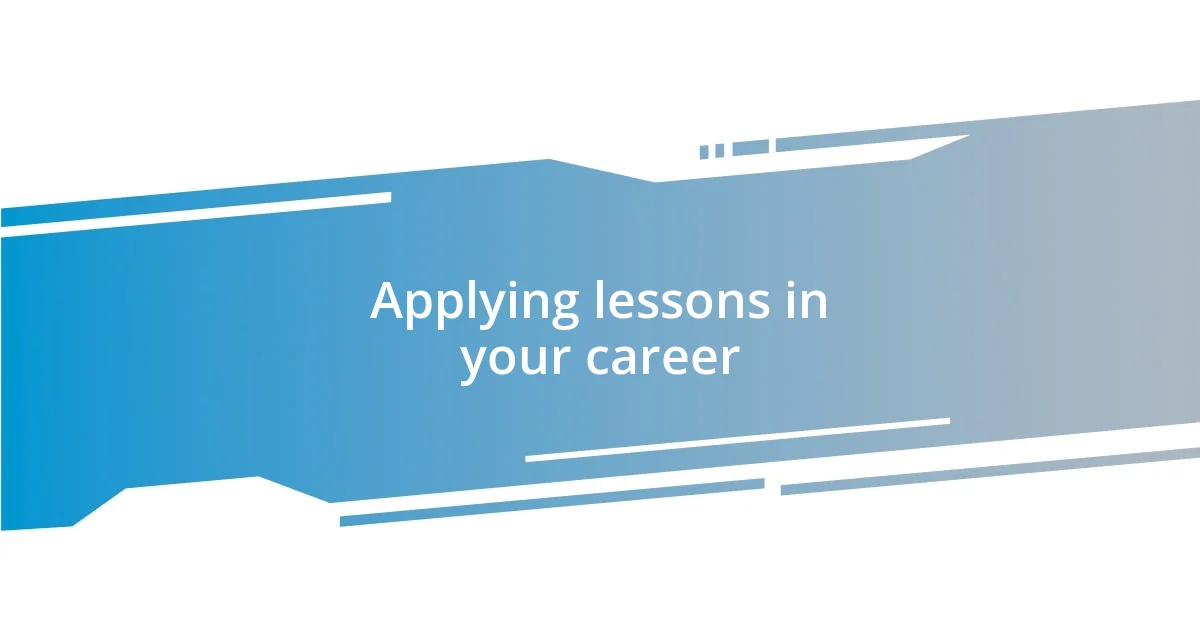
Applying lessons in your career
Applying lessons from mentors in your career can profoundly shape your development. I once faced a pivotal moment when a mentor suggested I take on a leadership role in a team project. Initially, I hesitated, worried about my inexperience. But I decided to embrace the challenge. That experience not only boosted my confidence but also honed my ability to guide others effectively. It made me realize that stepping out of my comfort zone often leads to remarkable growth.
In another instance, I was encouraged to network beyond my usual circles. At first, the idea seemed daunting, but following my mentor’s advice, I attended industry events and conferences. The connections I made opened doors I never anticipated. I often ask myself, “What if I had stayed in my comfort zone?” Seeing the opportunities that sprouted from those interactions reinforced the lesson that applying mentorship guidance can be transformative in ways I hadn’t considered.
Embracing a mindset of continuous learning has also been invaluable. My mentor taught me that every experience—good or bad—holds a lesson. I remember dropping the ball on a project deadline; it was a tough moment. But instead of avoiding the issue, I detailed all the factors that contributed to the misstep. This reflection not only clarified what went wrong but also enabled me to create strategies to ensure it wouldn’t happen again. It hit me that accountability is key—how often do we reflect on our mistakes? By applying these lessons actively, we become more resilient and equipped to handle future challenges.
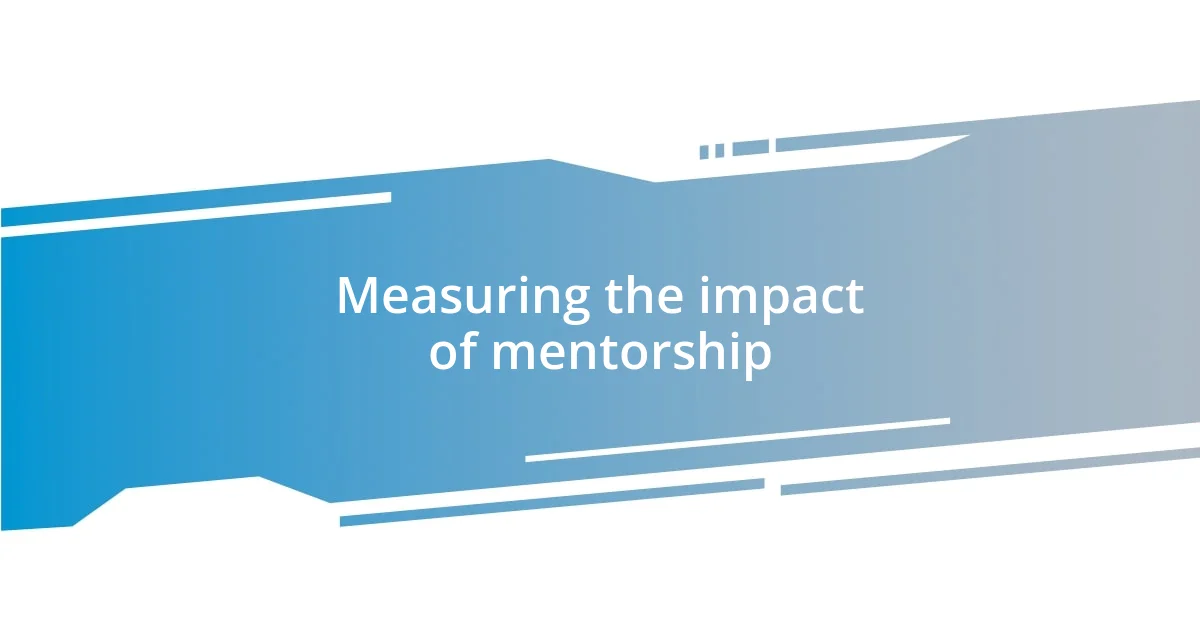
Measuring the impact of mentorship
Measuring the impact of mentorship can sometimes feel elusive, yet I’ve found that reflecting on specific outcomes is incredibly illuminating. For instance, after working closely with a mentor, I noticed a marked improvement in my decision-making skills. It wasn’t just a matter of feeling more confident; I could see clear examples where I navigated complex situations successfully. This realization pushed me to quantify my progress, leading me to ask, “How often do you evaluate your growth?”
One approach I’ve embraced is setting concrete goals based on my mentor’s feedback. After a particularly enlightening session about presenting ideas persuasively, I decided to aim for a promotion presentation at work. That experience was a whirlwind; I reflected on my preparation, what I applied from my mentor’s teachings, and the response I received. I realized that the way my ideas were received directly correlated to the efforts I had put into understanding my audience’s needs. This kind of measurement isn’t just about professional advancement; it’s personal growth laid bare.
Additionally, I’ve discovered that my understanding of mentorship’s impact deepens through peer feedback. I sought opinions from colleagues after implementing strategies learned from my mentor, and their positive responses were eye-opening. It made me consider: “How often do we overlook the voices around us when assessing our successes?” Their insights helped me gauge the ripple effect of mentorship—not only in my own career but also in how it influences my team dynamics. I found that mentorship isn’t a solo journey; it’s interconnected, amplifying the lessons learned and shared experiences.











